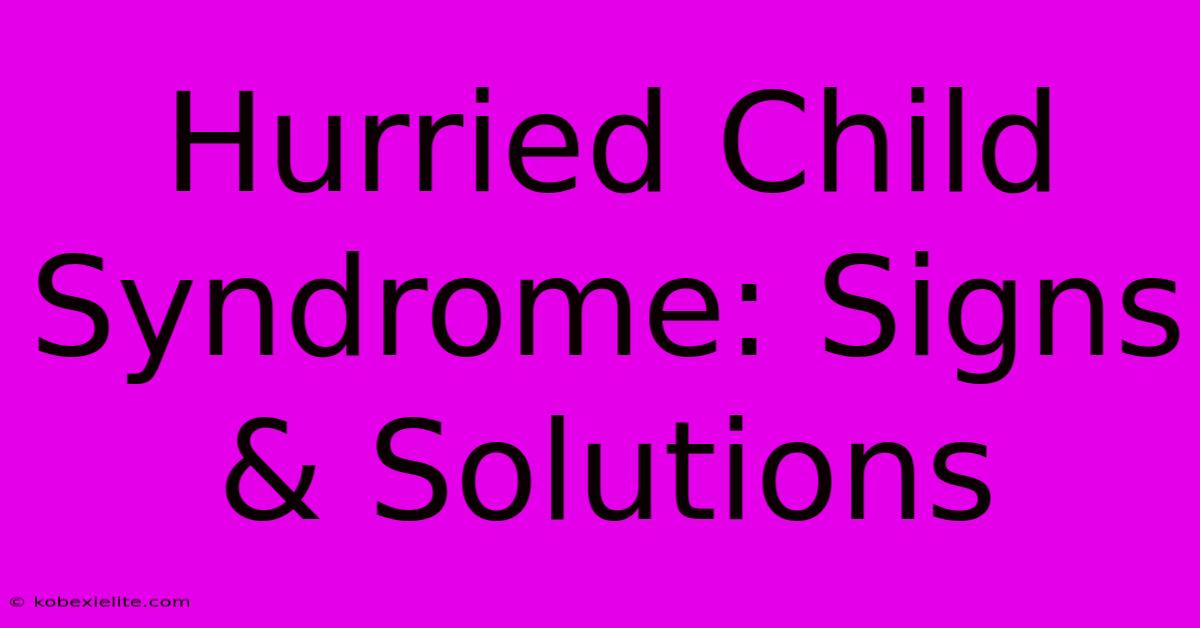Hurried Child Syndrome: Signs & Solutions

Discover more detailed and exciting information on our website. Click the link below to start your adventure: Visit Best Website mr.cleine.com. Don't miss out!
Table of Contents
Hurried Child Syndrome: Recognizing the Signs and Finding Solutions
Are you rushing your child through childhood? In today's fast-paced world, it's easy to fall into the trap of hurrying our children to meet milestones, achieve academic success, and excel in extracurricular activities. But this pressure can lead to Hurried Child Syndrome, a condition with potentially significant long-term consequences. This article explores the signs of Hurried Child Syndrome and offers practical solutions to help parents nurture their children's healthy development.
Understanding Hurried Child Syndrome
Hurried Child Syndrome, a term coined by child psychologist David Elkind, describes the negative effects of excessive pressure placed on children to achieve and grow up too quickly. It's not about ambition; it's about the method and the pace. Instead of allowing children to develop naturally at their own pace, parents often push them into activities and expectations that are beyond their developmental capabilities. This can lead to stress, anxiety, and a diminished sense of self-worth.
Key Signs of Hurried Child Syndrome:
- Academic Pressure: Children constantly pushed to achieve high grades, take advanced classes, and excel in standardized tests, often at the expense of their well-being and other interests.
- Over-Scheduled Lives: Children enrolled in numerous extracurricular activities, leaving little time for free play, relaxation, and social interaction.
- Loss of Childhood: Children expected to behave and act like adults, robbed of the opportunity to experience the joys and innocence of childhood.
- Anxiety and Depression: Children experiencing high levels of stress, anxiety, and depression due to the constant pressure to perform.
- Low Self-Esteem: Children feeling inadequate and constantly comparing themselves to others, leading to low self-esteem and a lack of self-confidence.
- Burnout: Children experiencing emotional and physical exhaustion due to overwhelming schedules and expectations.
- Sleep Deprivation: Insufficient sleep due to over-scheduling, impacting both physical and mental health.
- Physical Health Issues: Stress and lack of sleep can manifest as physical ailments, such as headaches, stomachaches, and weakened immune systems.
The Impact of Hurried Child Syndrome
The consequences of Hurried Child Syndrome can be far-reaching, affecting a child's:
- Mental Health: Increased risk of anxiety, depression, and other mental health issues.
- Physical Health: Weakened immune system, sleep disorders, and other physical ailments.
- Academic Performance: Ironically, excessive pressure can lead to decreased academic performance due to stress and burnout.
- Social Development: Limited opportunities for social interaction and development of healthy relationships.
- Self-Esteem: Development of low self-esteem and a lack of self-confidence.
Solutions to Prevent and Address Hurried Child Syndrome
Prioritize Child-Led Activities: Encourage free play, unstructured time, and activities that your child chooses. Let them explore their interests at their own pace.
Limit Extracurricular Activities: Focus on a few activities that your child genuinely enjoys, rather than overloading them with numerous commitments.
Foster a Growth Mindset: Emphasize effort and progress rather than solely focusing on achievement. Celebrate effort and learning, not just grades.
Open Communication: Create a safe space for your child to share their feelings and concerns. Listen actively and validate their emotions.
Promote Self-Care: Ensure your child gets enough sleep, eats healthy foods, and engages in regular physical activity. Encourage relaxation techniques like deep breathing or mindfulness.
Set Realistic Expectations: Avoid setting unrealistic expectations and goals for your child. Encourage them to strive for their personal best, not perfection.
Model Healthy Habits: Children learn by observing their parents. Model healthy habits such as stress management, work-life balance, and self-care.
Seek Professional Help: If you're concerned about your child's well-being, seek professional guidance from a therapist, counselor, or child psychologist. They can provide support and strategies to help your child cope with stress and pressure.
Conclusion:
Hurried Child Syndrome is a serious issue with potentially long-lasting consequences. By understanding the signs and implementing the solutions outlined above, parents can create a nurturing environment that allows children to thrive and flourish at their own pace. Remember, childhood is a precious time—let's not rush it. The goal isn't to produce a perfect child, but a happy, healthy, and well-adjusted adult.

Thank you for visiting our website wich cover about Hurried Child Syndrome: Signs & Solutions. We hope the information provided has been useful to you. Feel free to contact us if you have any questions or need further assistance. See you next time and dont miss to bookmark.
Featured Posts
-
Baftas 2025 Every Award Winner
Feb 18, 2025
-
New State Department Website Fiery Response
Feb 18, 2025
-
How To Watch Love Island Finale S2
Feb 18, 2025
-
Conceicao Explains His Juventus Goal
Feb 18, 2025
-
Demi Moore Sensational At 62
Feb 18, 2025
